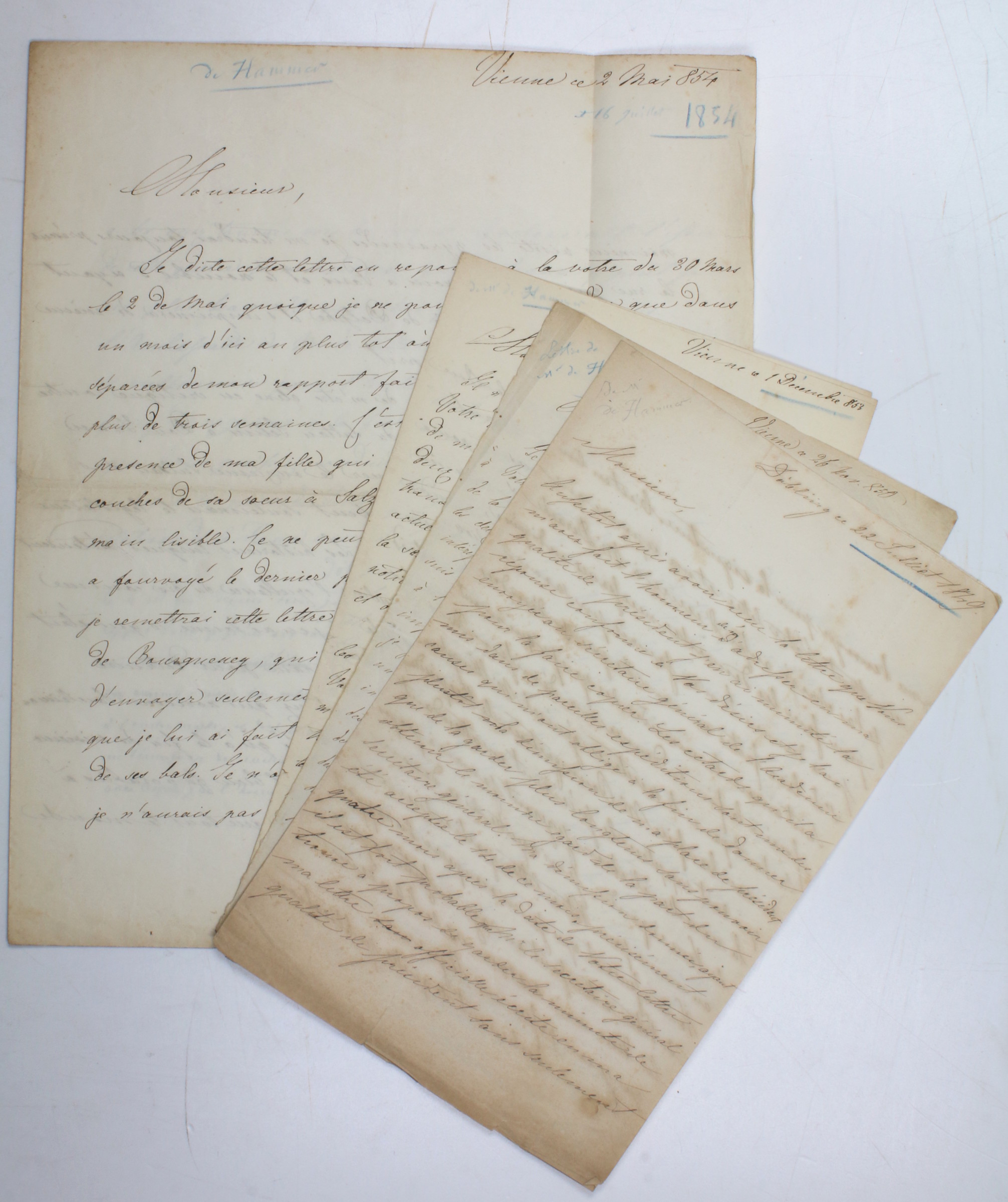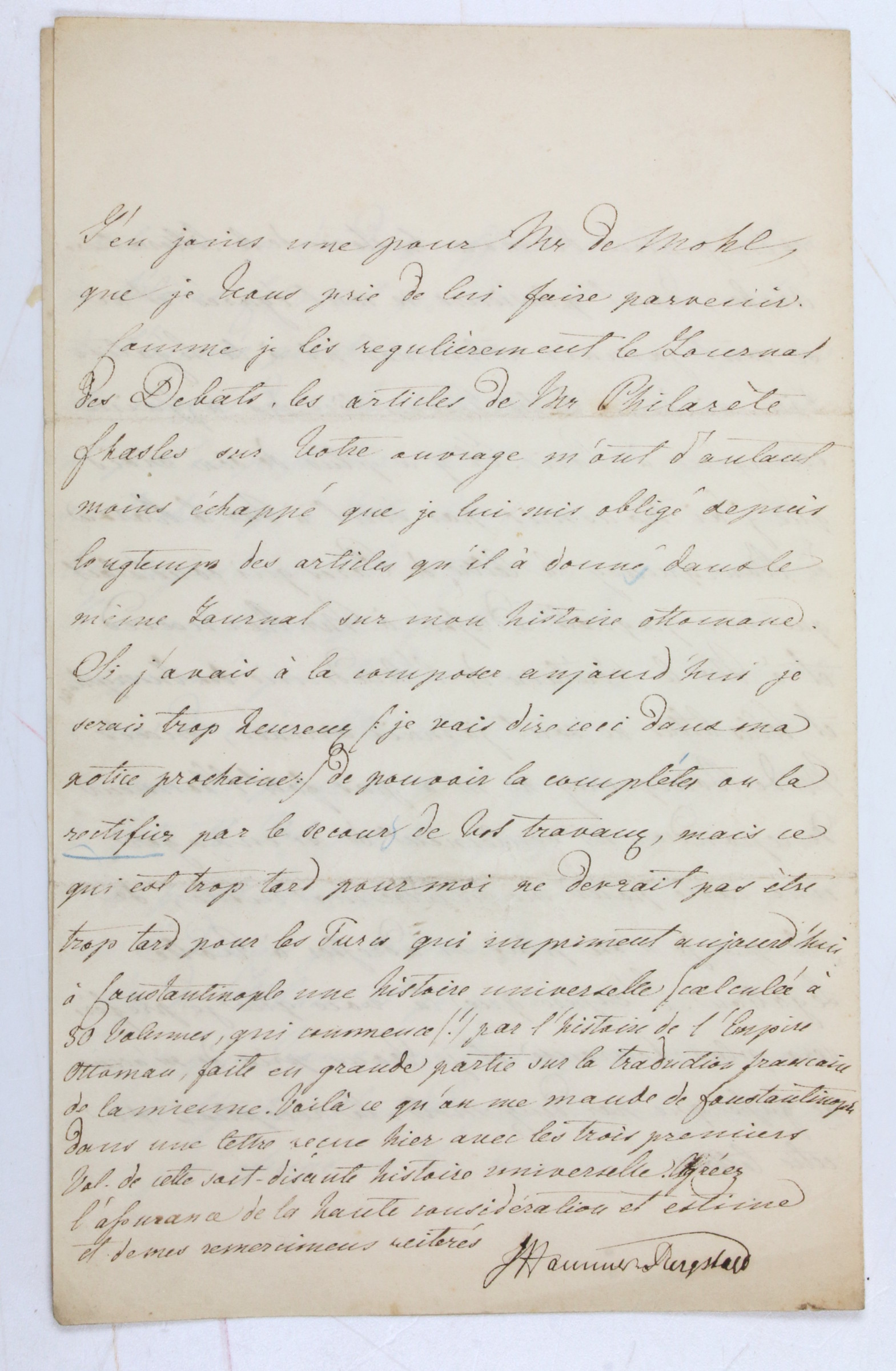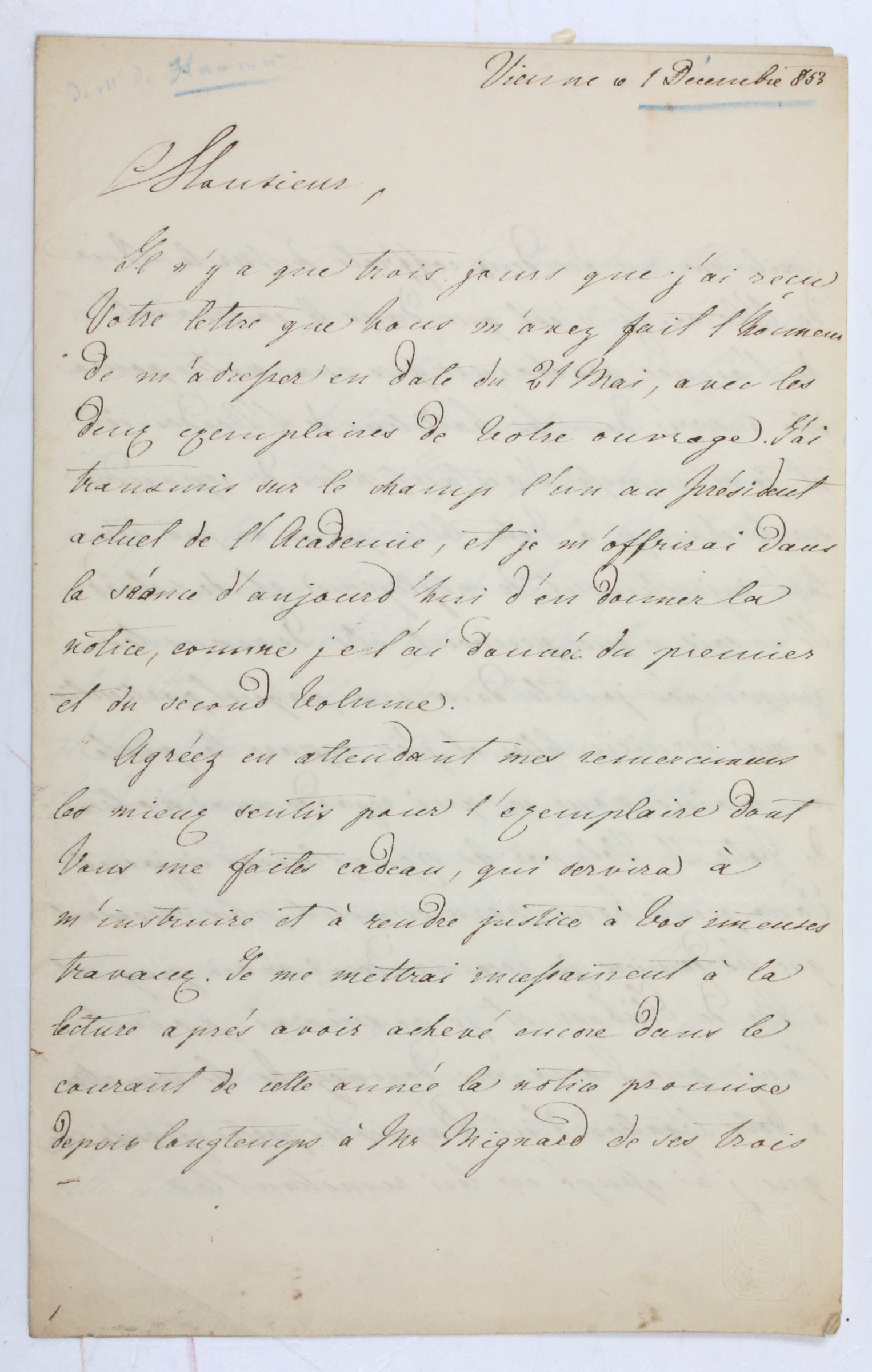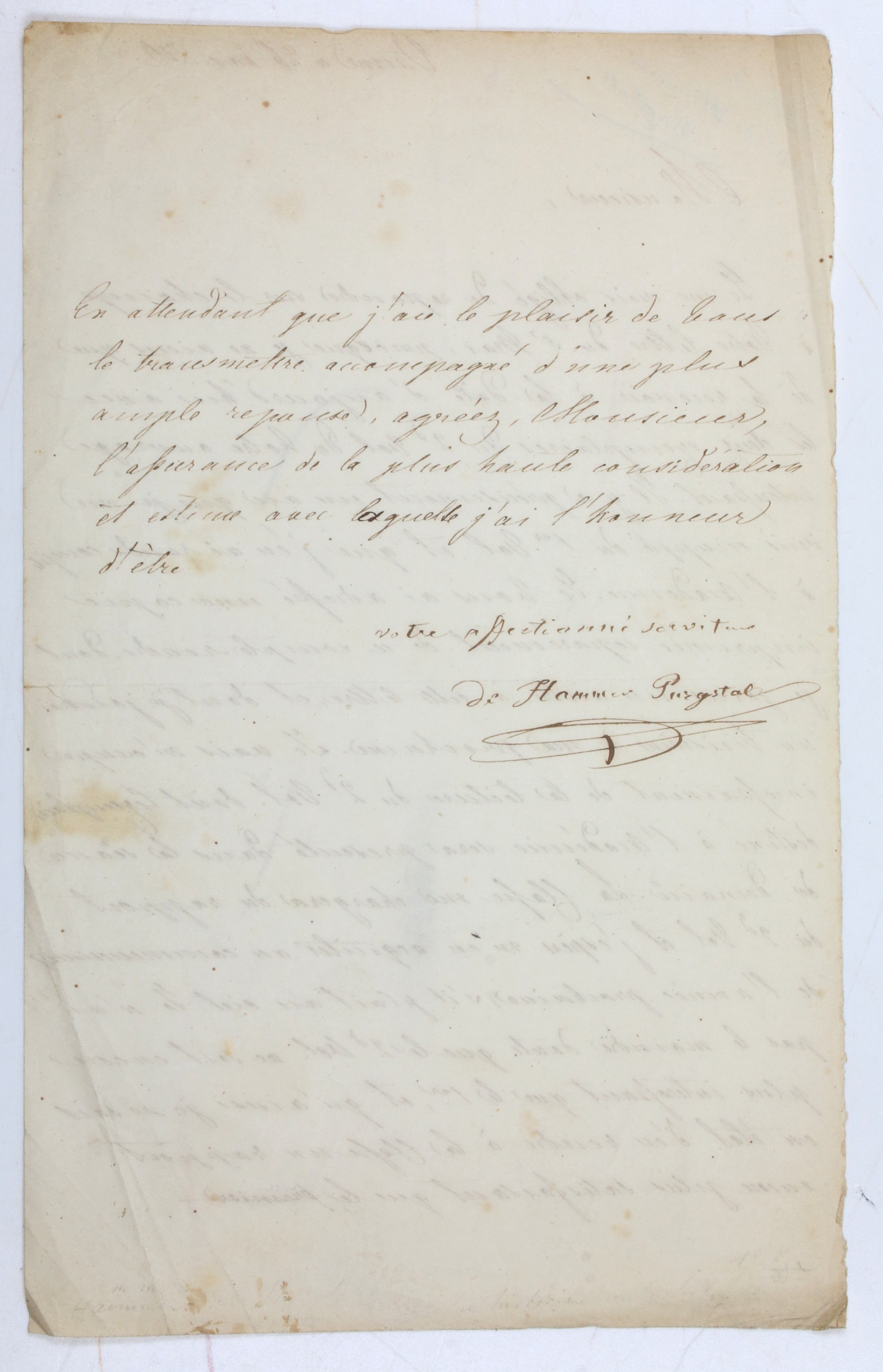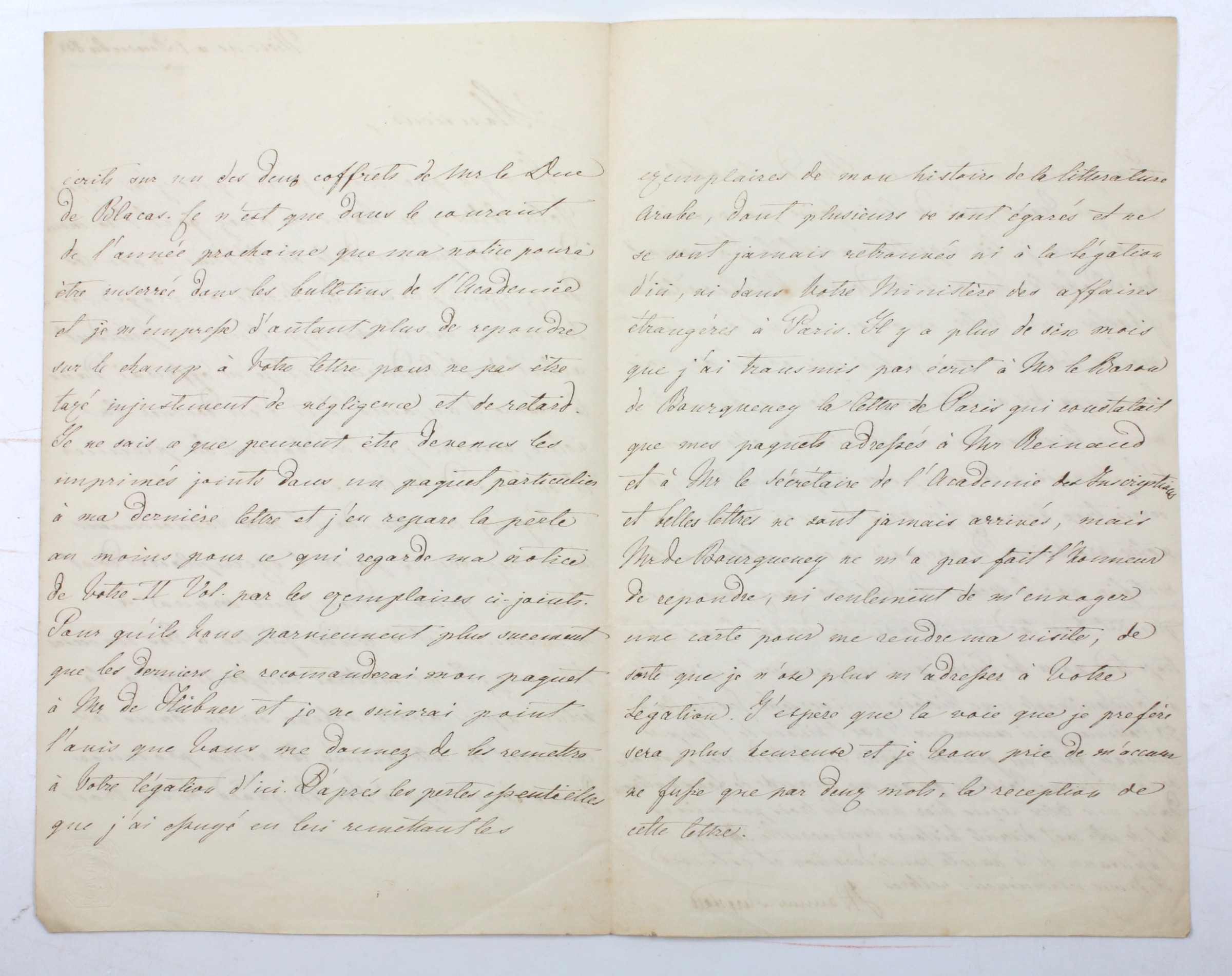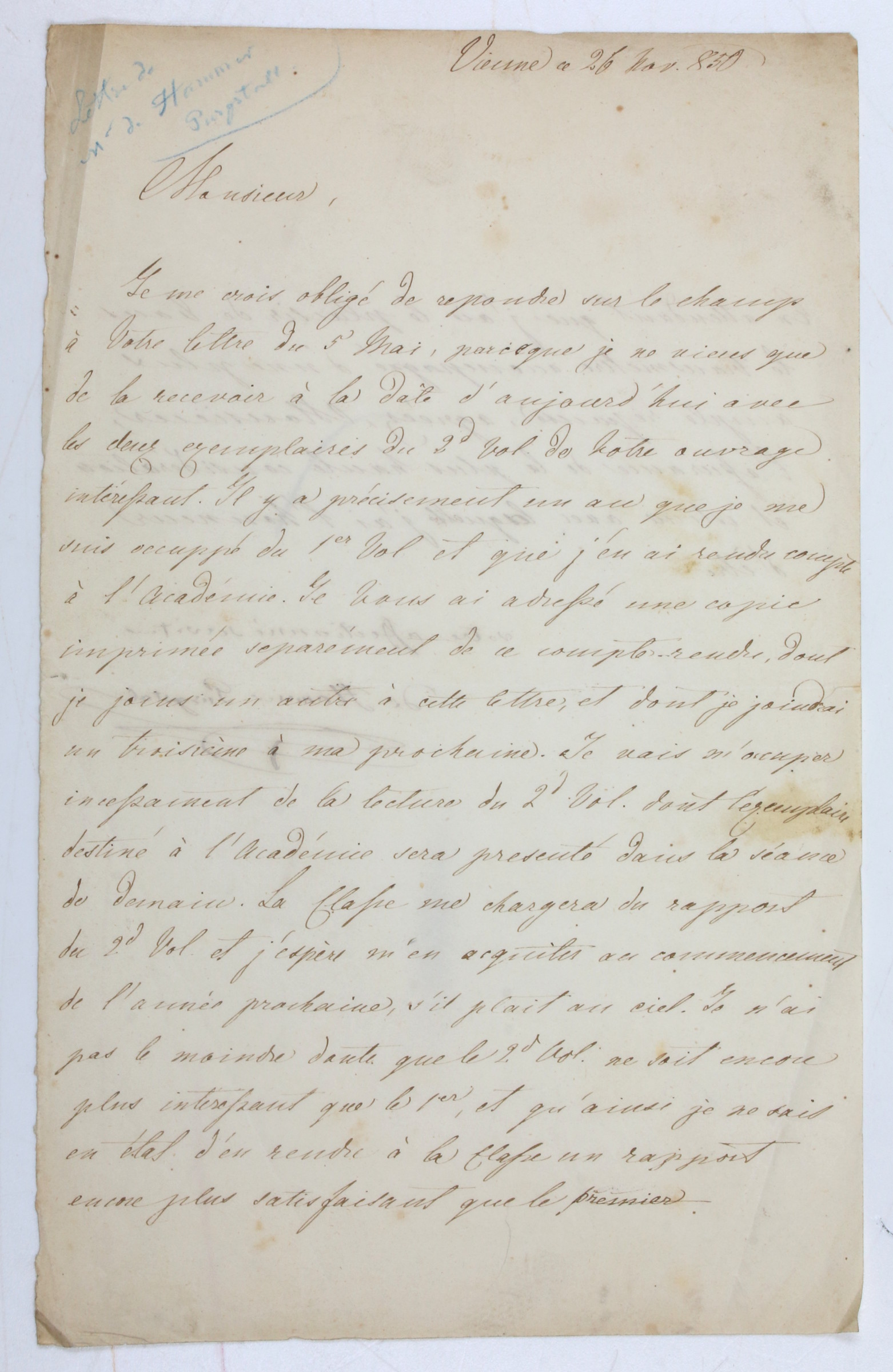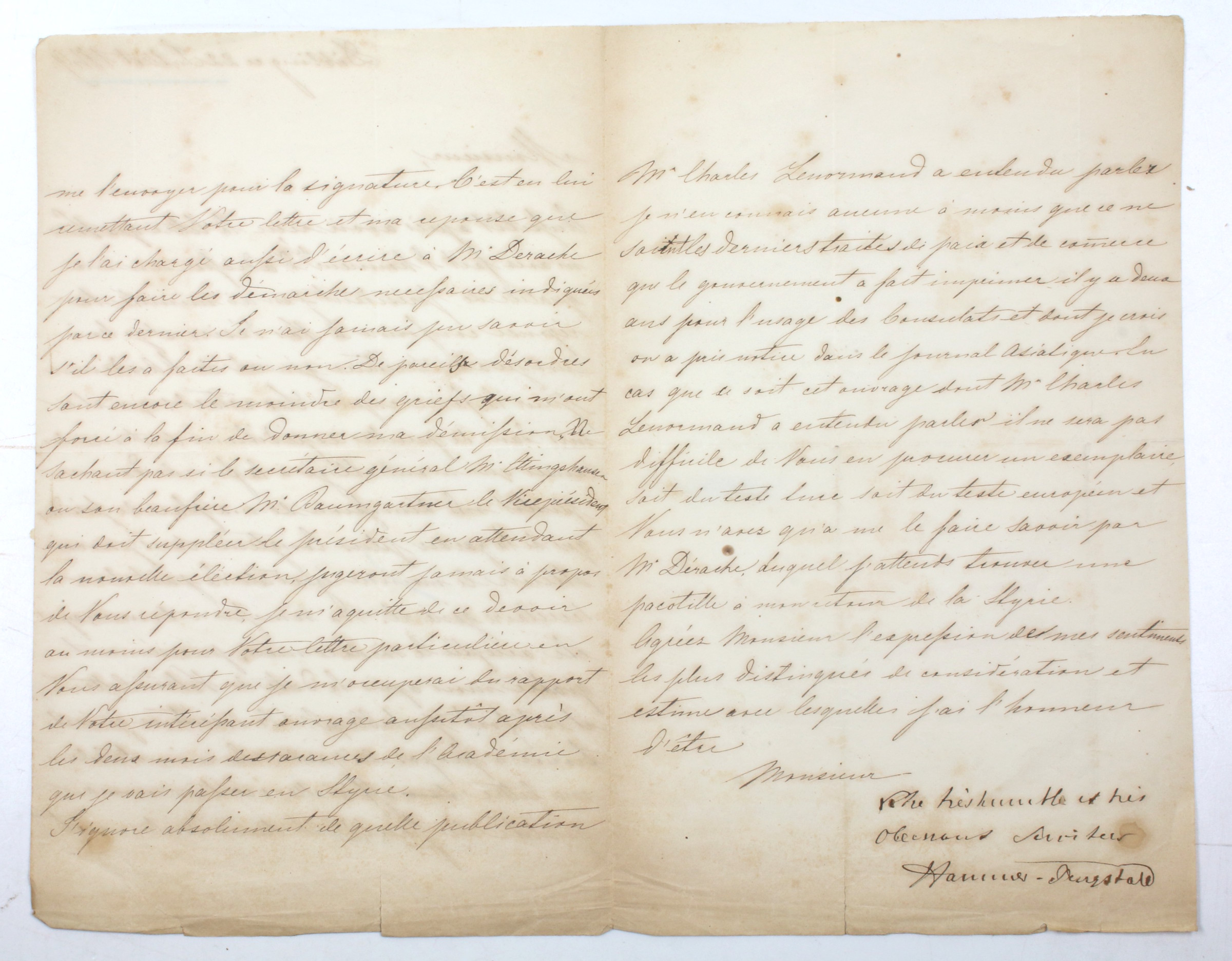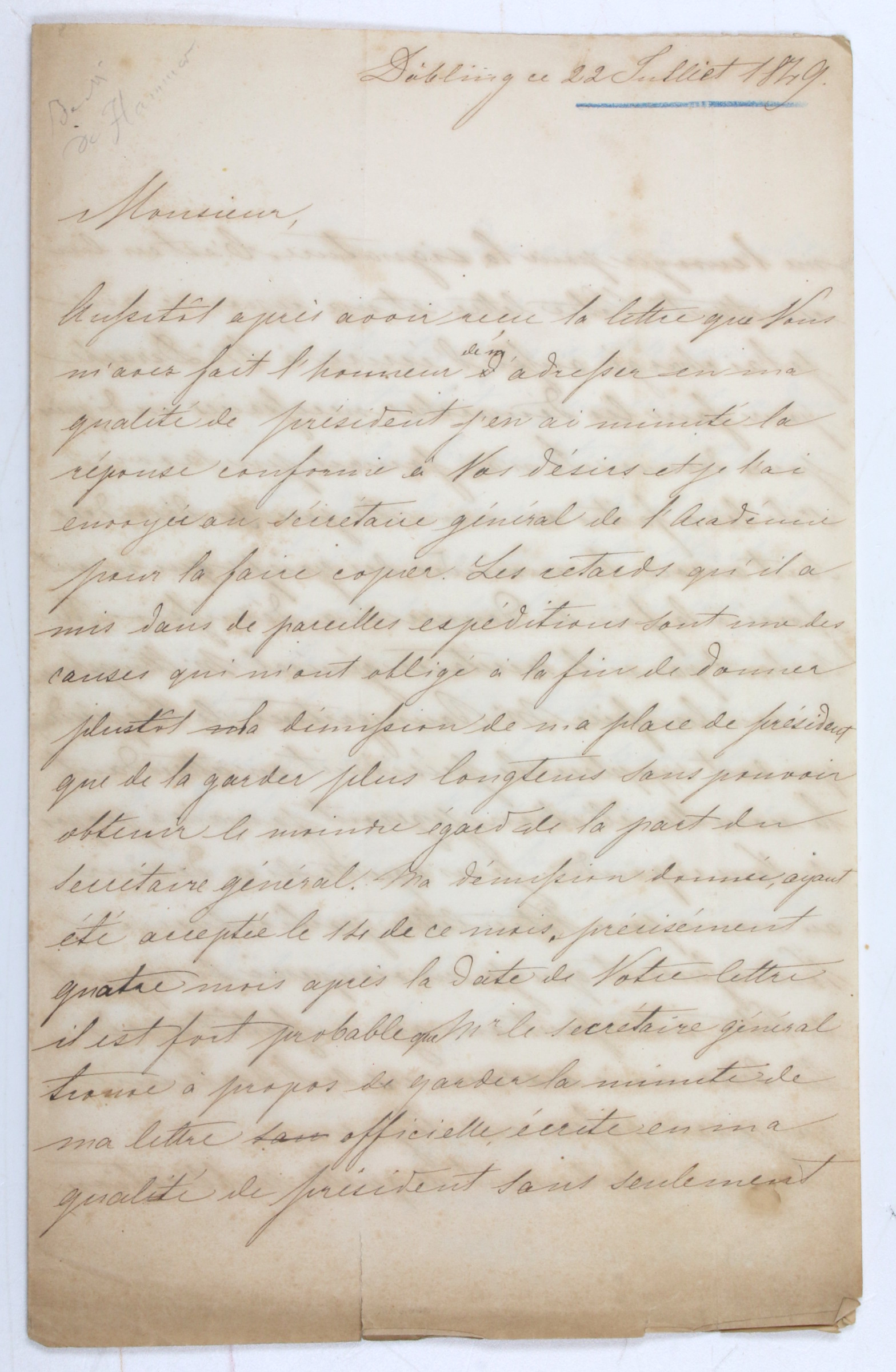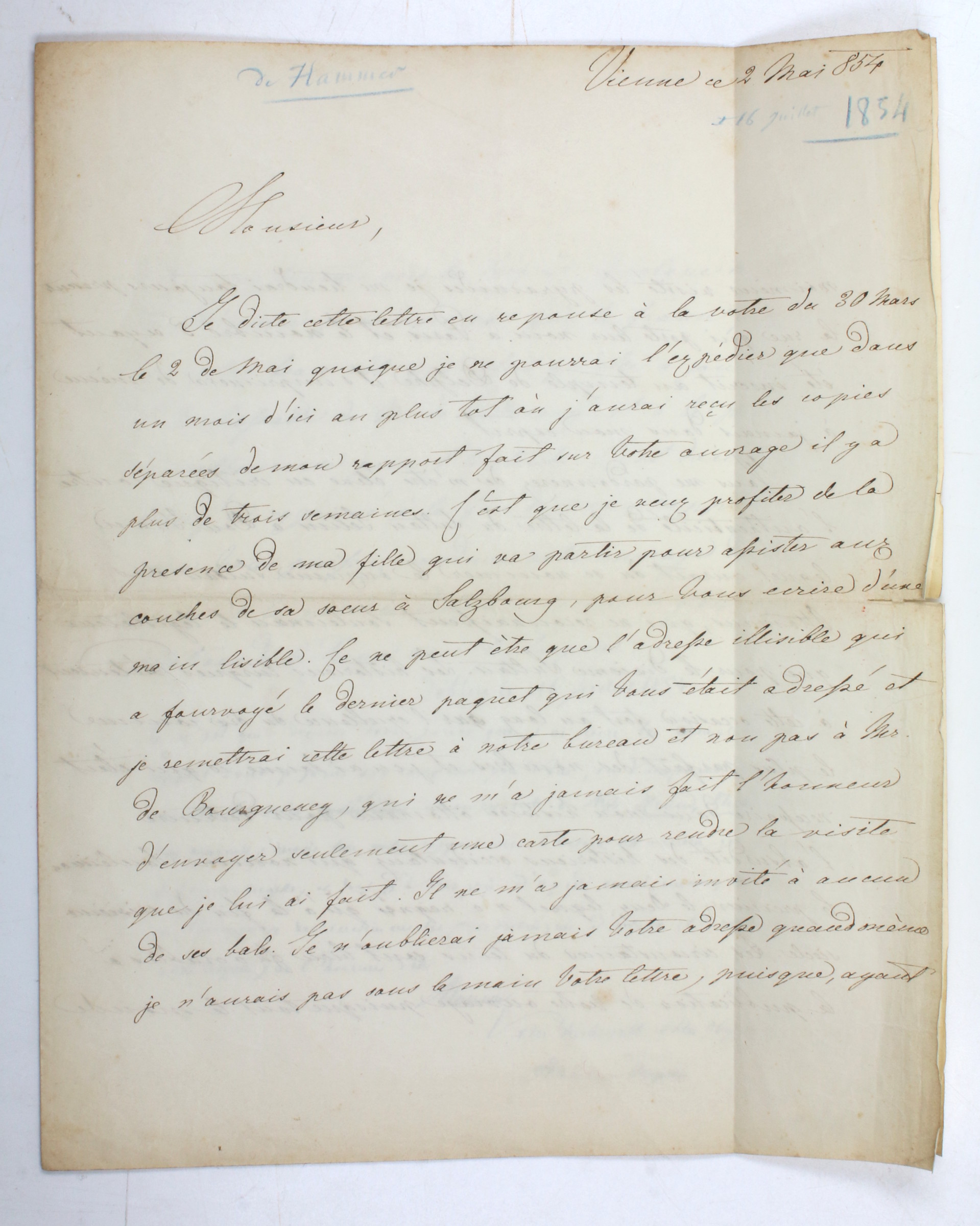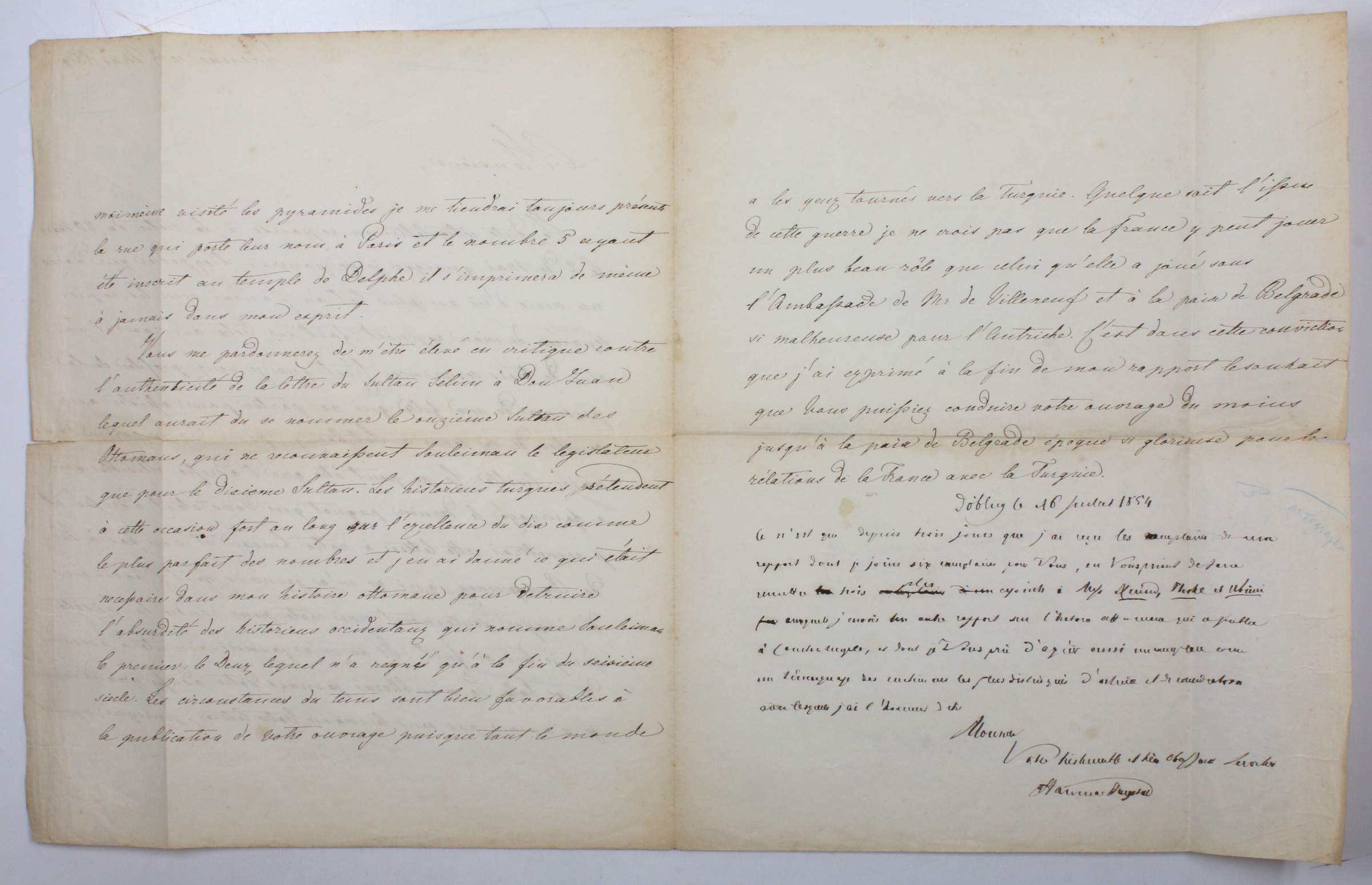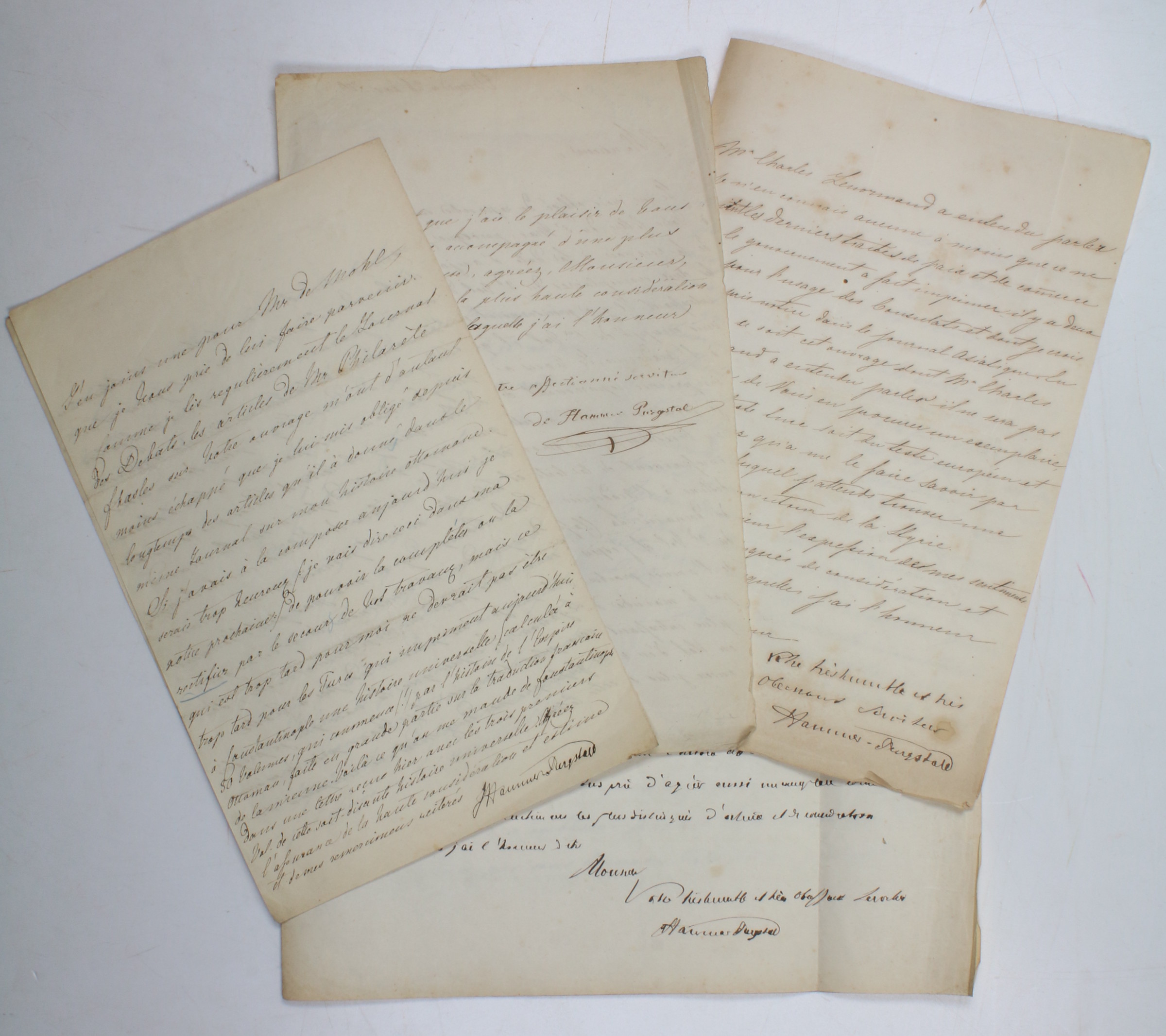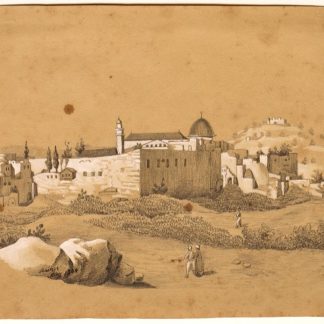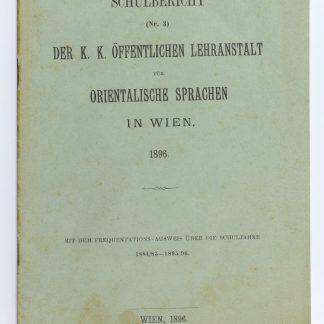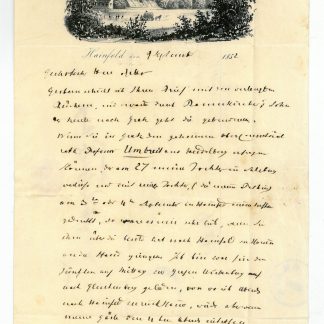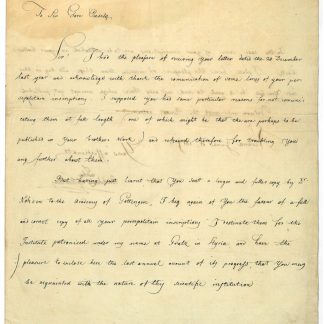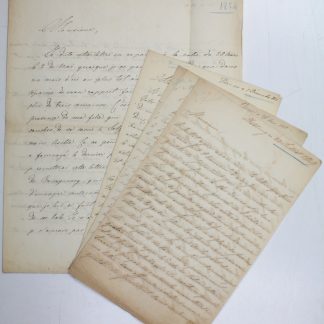"I have done what was necessary in my Ottoman history to destroy the absurdity of the Western historians who name Suleiman the first: the second": Joseph von Hammer-Purgstall in correspondence with Ernest Charrière
3 letters signed and 1 letter with autograph postscript signed.
4to and 8vo. Together 11½ pp. In French.
€ 3,500.00
Highly interesting correspondence with the French historian and translator Ernest Charrière (1805-65), concerning Charrière's compilation of archival material from the French embassy in Constantinople entitled "Négociations de la France dans le Levant, ou Correspondances, mémoires et actes diplomatiques des ambassadeurs de France à Constantinople". Hammer-Purgstall wrote reviews of the first three volumes for the proceedings of the philosophical-historical class of the Austrian Academy of Sciences in 1849, 1850 and 1853, generally lauding Charrière's "immense work". The correspondence also touches upon Hammer-Purgstall's conflict with the Academy and his resignation as its president in 1849 and offers a glimpse at his scientific network in his later years.
In the earliest letter from 22 July 1849, Hammer-Purgstall informs Charrière that he stepped down from the presidency one month after Charrière had addressed him in this function and did not know whether the secretary general ever used his draft for an official response, citing this lack of communication as "only the smallest of the grievances that ultimately forced me to tender my resignation". Thus, "not knowing whether the secretary general M. Ettingshausen or his brother-in-law Mr. Baumgartner, the vice-president who has to act as president until the new election, ever judged it expedient to respond", Hammer-Purgstall decided to assure Charrière personally that he will write the report on his publication. In closing, he answers a question about a document that the French archaeologist Charles Lenormant (1802-59) had apparently mentioned to Charrière: "I do not know of any unless it is the latest peace and trade treaties that the government had printed two years ago for the use of the consulates and of which I believe notice was taken in the Journal Asiatique. If it is this work of which M. Charles Lenormand [!] has heard, it will not be difficult to obtain a copy of it, either of the Turkish or the European text".
On 26 November 1850, Hammer-Purgstall informs Charrière of having received the 2nd volume, even though it had been sent as early as May, and promises another review: "I shall be busy reading the second volume, the copy of which is to be presented to the Academy at tomorrow's session. The class will charge me with the report of the 2nd vol. and I hope to accomplish it by the beginning of next year, if it pleases Heaven. I have no doubt that the 2nd volume will be even more interesting than the 1st, and that I will be able to give the class an even more satisfactory report than of the first".
Hammer-Purgstall also received the third volume with great delay, announcing its arrival in a letter from 1 December 1853, seven months after it had been sent. He thanks Charrière for the gift of one of the copies and announces that he shall inform the Academy during the next session and will write a report that should be printed in the course of the following year. Apparently, copies of the first report got lost in the mail, so Hammer-Purgstall included some with this letter. This time, he would not try to send anything through the French embassy, as many books that he had sent to the orientalist and historian Joseph Toussaint Reinaud (1795-1867) and others never arrived, and he was apparently on poor terms with the French ambassador in Vienna, François-Adolphe de Bourqueney (1799-1869): "So that they may reach you more surely than the last ones, I will hand over my package to M. de Hübner and I will not follow the advice you give me to hand it over to your legation here after the essential losses I suffered when I handed over the copies of my history of Arabic literature, several of which were lost and never found, neither at the legation here nor at your Foreign Office in Paris. It is more than six months since I forwarded to M. Baron de Bourqueney the letter from Paris which stated that my packages addressed to M. Reinaud and to the Secretary of the Academy of Inscriptions and Belles Lettres were never received, but M. de Bourqueney did not do me the honour of a response, nor did he send me a card to return my visit, so that I no longer dare to address your legation".
In closing, he asks Charrière to present an additional copy of his report to the German orientalist Julius Mohl (1800-1876) and mentions that he is aware of the reviews of Philarète Chasles (1798-1873) in the Journal des Débats, who had previously reviewed Hammer-Purgstall's own "History of the Ottoman Empire", which he would now "complete or rectify with the help" of Charrière's work if he still had the time: "but what is too late for me should not be too late for the Turks who are now printing in Constantinople a universal history calculated at 30 volumes, which begins with the history of the Ottoman Empire, based in large part on the French translation of mine. This is what I am told from Constantinople in a letter received yesterday with the first three volumes of this so-called universal history".
In the highly interesting final letter that he first dictated to his daughter on 2 May 1854, considering her "legible hand", but sent with a dated autograph postscript only on 16 July 1854, Hammer-Purgstall questions the authenticity of one of the documents printed in the third volume of Charrière's compilation and contextualizes the publication with the Crimean War that had started in October 1853. In a charming remark, Hammer tells Charrière how he remembers his Parisian address: "I will never forget your address even if I do not have your letter at hand, since, having visited the pyramids myself, I will always remember the street in Paris that bears their name, and the number 5, having been inscribed in the temple of Delphi, will be imprinted in my mind forever". The latter "clue" is a reference to Plutarch's interpretation of the so-called "Delphic symbol" that resembles an epsilon. The document that he suspected to be a forgery was a letter purportedly written by Sultan Selim to Don Juan de Austria, concerning the Battle of Lepanto in 1571: "You will forgive me for having voiced doubts over the authenticity of the letter of the Sultan Selim to Don Juan, who should have named himself the 11th Sultan of the Ottomans, who only recognize Suleiman the legislator as the 10th Sultan. The Turkish historians talk at length in this respect about the excellence of the ten as the most perfect of the numbers, and I have done what was necessary in my Ottoman history to destroy the absurdity of the Western historians who name Suleiman the first: the second, who reigned only at the end of the 16th [17th] century".
Hammer interprets the Crimean War as advantageous for Charrière's publication and compares the role of France in this conflict to her diplomacy during the Austro-Turkish War of 1735-39, when the French ambassador Louis Sauveur de Villeneuve negotiated the Treaty of Begrade that was very unfavourable for the Austrians, expressing his hope that Charrière's work will eventually cover this period: "The circumstances of the time are very favourable to the publication of your work since everyone's eyes are on Turkey. Whatever the outcome of this war, I do not believe that France can play a more beautiful role than the one she played under the embassy of Mr. de Villeneuf [!] and at the peace of Belgrade, so unfortunate for Austria. It is in this conviction that I expressed at the end of my report the wish that you be able to pursue your work at least until the peace of Belgrade, an age so glorious for Franco-Turkish relations".
In his autograph postscript, Hammer asks Charrière to pass on copies of his report on the second volume to Julius Mohl, Joseph Toussaint Reinaud, and an unidentified scholar.
Joseph von Hammer-Purgstall did not live to see or review the fourth and final volume of Charrière's compilation that appeared in 1860, four years after Hammer's death. The final letter and the letter from 26 November 1850 were probably both dictated to his youngest daughter Eveline (1824-87).
Some browning and occasional tears to the folds. With recipient's marks in crayon.

